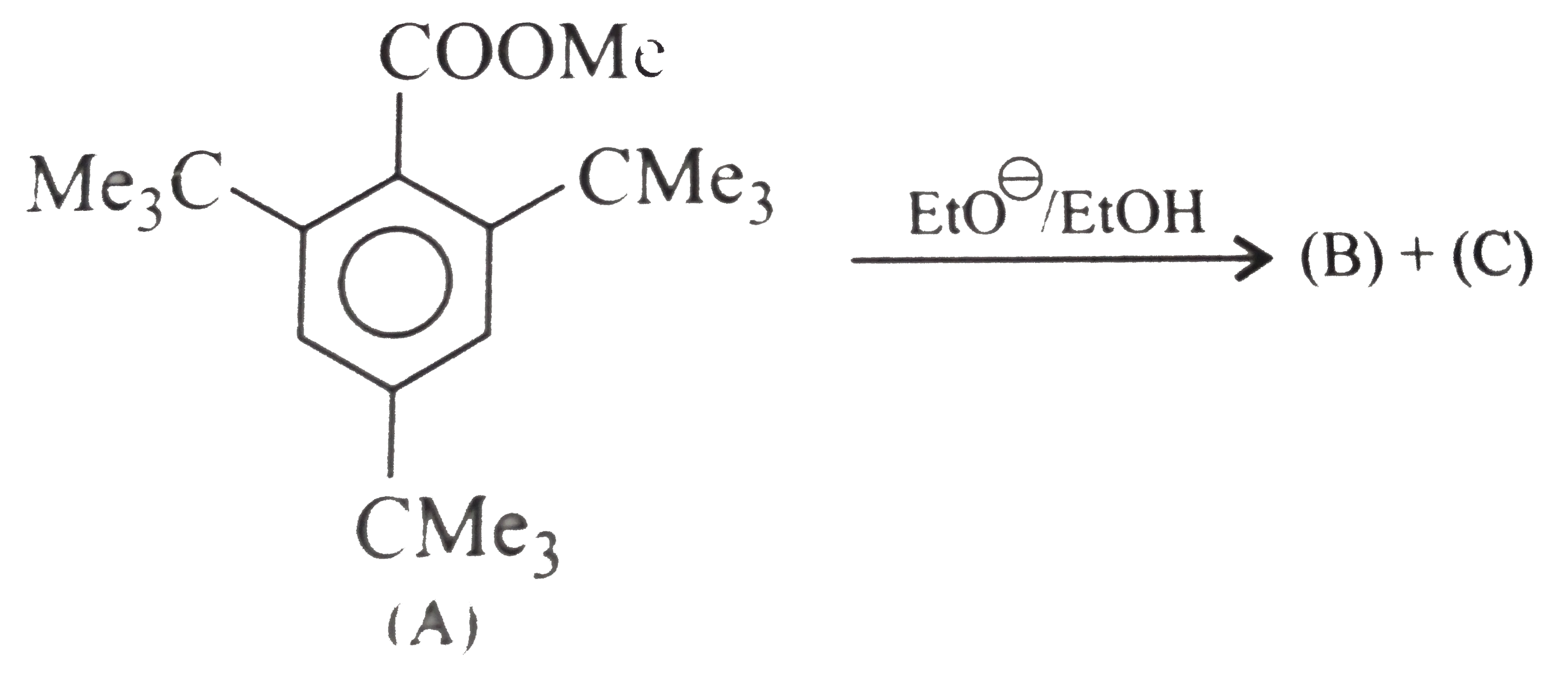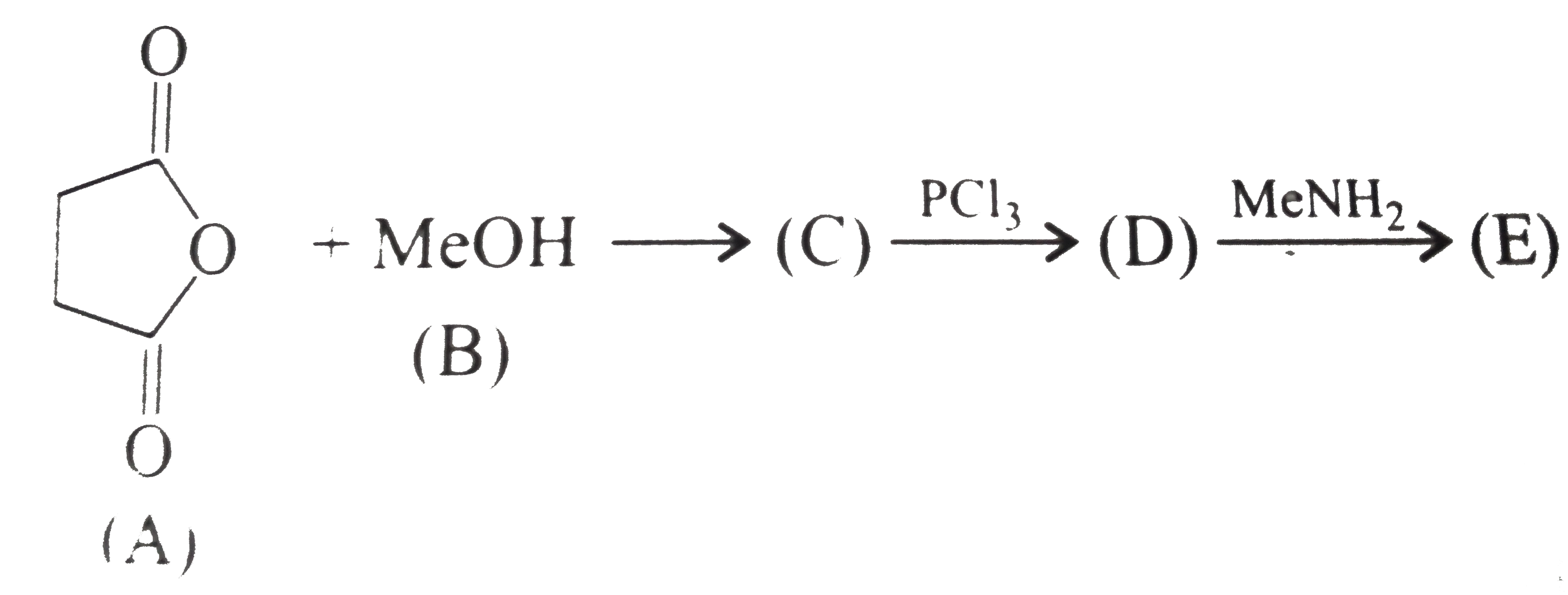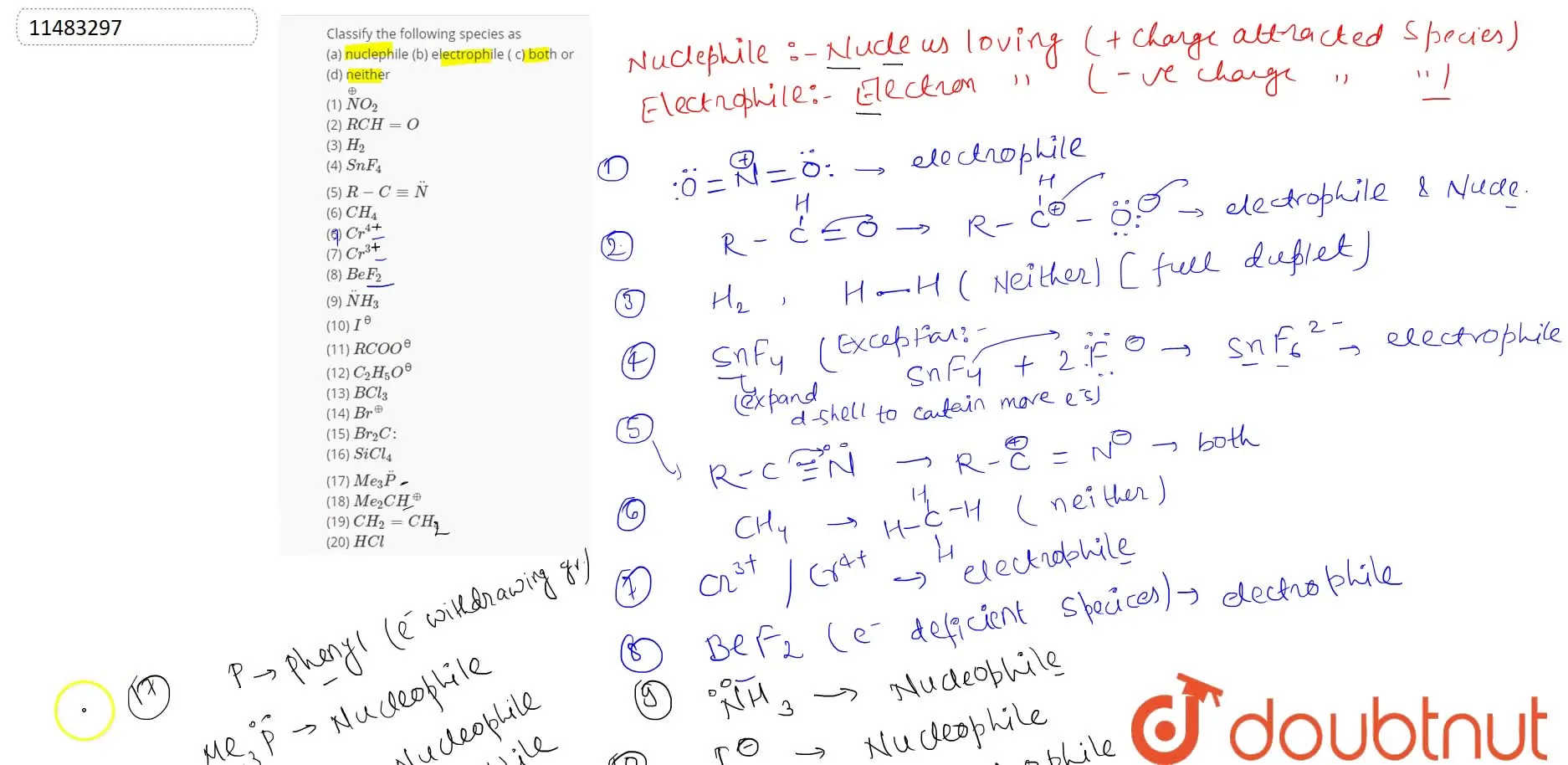Classify the following species as
(a) nuclephile,
(b) electrophile,
( c) both, or
(d) neither.
(1) ⊕NO2
(2) RCH=0
(3) H2
(4) SnF4
(5) R−C≡..N
(6) CH4
(6) Cr4
(7) Cr3
(8) BeF2
(9) ..NH3
(10) IӨ
(11) RCOOӨ
(12) C2H5OӨ
(13) BC13
(14) Br⊕
(15) Br2C:
(16) SiC14
(17) Me3..P
(18) Me2CH⊕
(19) CH2=CH4
(20) HC1
(21) Me3C..Ө.
a. Nucleophiles: 9,10,11,12,17,19, and 21
(9) ..NH3(LP¯es),(10):..I..:Θ (negative charge with LP¯es),(11)RCO..O..:Θ (negative charge with LP¯es),(12)C2H5OΘ (negative charge with LP¯es),(19)CH2=CH2 (has two available ¯es in a π-bond), (21)Me3C..Θ (negative charge with LP¯es)
(b) Electrophiles : 1,4.7,8,13,14,15,16,18, and 20
(1) NO⊕2(:..O=⊕N=..O:) (the electrophilic character completely masks the nucleophilic character of LP¯es on O atom.)
(4) SnF4 (it has eight valence ¯e,s, but it can accept LP¯e,s of a nucleophile by expanding its d shell to 12¯e,s)
SnF4+2:..F..:Θ→|SnF6|−2
(7) Cr3+ (positive charge)
(8) BeF2(¯e deficient, can accept ¯e,s from a nucleophile in its vaccant p orbital. Moreover, bonded F atoms are rarely nucleophilic.)
(13) BC13(¯e deficient, six ¯e,s, can accept ¯e,s from a nucleophile to acquire stable octet)
Br⊕ (positive charge)
(15) Br2C:(¯e deficient, six ¯e,s, can accept ¯e,s from a nucleophile to acquire stable octet.)
(16) SiC14 [same explanation as in (13).]
(18) Me2⊕CH [same explanation as in (13)]
(20) HC1 (Bronsted acid, can donate H⊕ which is ¯e deficient)
( c) Both : (2) and (5) (R−CH=O and R−C≡N)
because C is π-bonded to a high EN atom (O and N, respectively). So, C is an electrophilic site, and O and N with LP¯e,s are nucleophilic sites.
(d) Neither : (3) and (6) ?(H2,CH4) They can neither accept or donate ¯e,s , moreover, they do not have vaccant p or d orbital to accept ¯e,s.
Related Playlists
- BOOK - CENGAGE CHEMISTRYCHAPTER - GENERAL ORGANIC CHEMISTRYEXERCISE - Solved Example18videos
GENERAL ORGANIC CHEMISTRY
- BOOK - CENGAGE CHEMISTRYCHAPTER - GENERAL ORGANIC CHEMISTRYEXERCISE - Subjective11videos
GENERAL ORGANIC CHEMISTRY
- BOOK - CENGAGE CHEMISTRYCHAPTER - CLASSIFICATION AND NOMENCLATURE OF ORGANIC COMPOUNDSEXERCISE - Analytical and Descriptive Type3videos
CLASSIFICATION AND NOMENCLATURE OF ORGANIC COMPOUNDS
- BOOK - CENGAGE CHEMISTRYCHAPTER - HYDROGEN, WATER AND HYDROGEN PEROXIDEEXERCISE - Subjective Archive (Subjective)3videos
HYDROGEN, WATER AND HYDROGEN PEROXIDE
Similar Questions
Which of the following species behave both as a nucleophile and an electrophile?
(i) CH3C=N: , (ii) CH4
(iii) H2C=O , (iv) H2View SolutionDetermine the F.C on each atom in :
(a) HOBr
(b) ⊕NH4
( c) H2O:BBr3.View SolutionClassify the following as electrophiles and nucleophiles:
(a) CN− (b) H2O (c) Br+ (d) NO−2 (e) +NO2
(f) CH3OH (g) H2C=CH2 (h) RCOCl (i) H2N−OH
(j) :(CCl2 (k) H3O+ (l) NH3 (m) BF3 (n) AlCl3
(o) OH− (p) R3NView SolutionCategorise the following molecules/ions ad nucleophile or electrophile.
(1) HSӨ
(2) BF3
(3) C2H5OӨ
(4) (CH3)3..N
(5) C1Ө
(6) CH3−⊕C=O
(7) :ӨNH2
(8) ⊕NO2.View SolutionCompare the stability of the following
(a)ӨCH3 (b)ӨNH2 (c)ӨOH (d)ӨFView Solution(NH4)2Cr2O7=N2+H2O+Cr2O3
View SolutionCr2O2−7+C2O2−4+H+=Cr3++CO2+H2O
View SolutionC2H5OH+Cr2O2−7+H+=Cr3++C2H4O+H2O
View SolutionGive the order of the stabilities of the following :
(i) (a) PhCH⊕2
(b) Ph2C⊕H
( c) Me2Ch⊕
(d) Me3C⊕
( e) C2H⊕5
(f) Ch⊕3
(ii) (1) PH3.C
(b) Ph.CH2
( c) Me3.C
(d) .C2H5
( e) .CH3
(iii) (a)
b) Ph3CӨ
( c) Me2CHӨ
(d) ӨCH3
( e) ӨC2H5
(f) Me3CӨ.View SolutionComplete the following reactions :
(a) C6H6+Ac2OAlCl3−−→(A)1.Br2/ӨOH−−−−−−→2.H3O⊕(B)
(b)
( c)
(d)
( e)
(f)
(g) .View Solution
.View Solution


